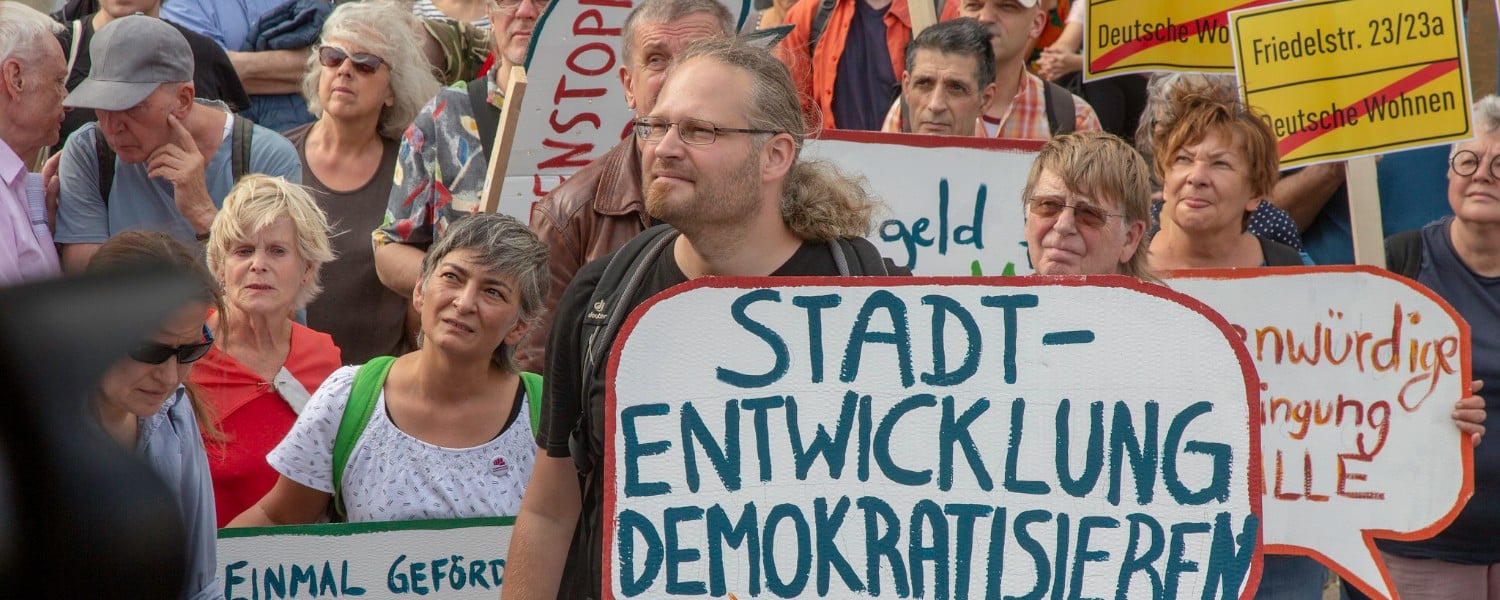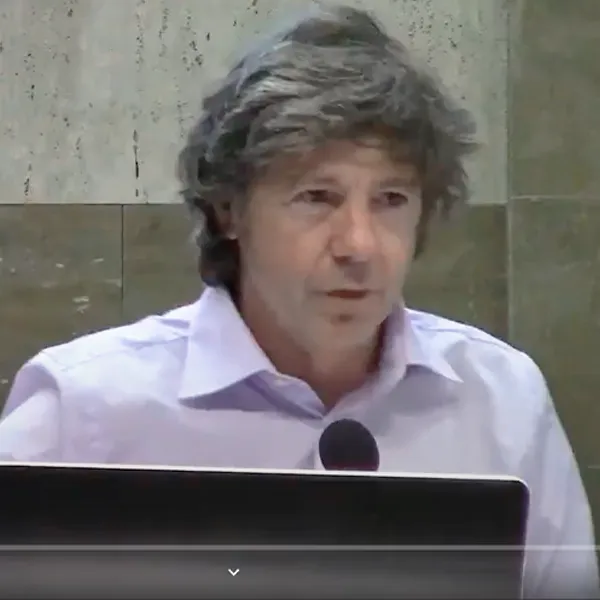In June 2019, 77,001 Berliners had already signed the initiative of the movement Deutsche Wohnen und Co. Enteignen (Expropriate Deutsche Wohnen and Co.), which aims to force the local authorities to organise a referendum on the partial expropriation of the biggest real estate companies in the city, who possess more than 3,000 apartments. According to activists, the initiative is necessary so it can allow for the Senate (the local federal government) to apply these measures, demanded by the movement, in order to resolve the housing crisis in the capital.
Approximately 85% of Berliners live in rented dwellings. Until the middle of the 2000s the supply of housing had accessible prices and the housing conditions were adapted for different exigencies and needs. Berlin’s popularity was owed, among other things, to these living conditions. But in the meantime, they have become history. This popularity was paralleled by a rise of the population, which, together with the rise of the political and economic weight of the city, stimulated the local government (Social-Democrat only in name) to introduce some neoliberal “reforms” on the local real estate market. Similar neoliberal policies in the real estate market were implemented earlier in London and Paris. Between 2012 and 2017, the rents in Berlin rose more than 50% (compared to an average annual rise in salaries of 2% in the last 10 years).
Today, the city’s local government proves to be ineffective on the issue of rising rents. This is because starting from the late 90s the local authorities were increasingly trying to compensate the large budgetary deficit of the city by selling off the publicly owned land and housing stock to private actors below market price. Since then, private ownership within the housing market has been dominated by enormous players such as Deutsche Wohnen or Vonovia. Through speculative methods they keep inflating rent prices. They also constantly try to push out citizens with smaller incomes and thus they abuse their economic power with regard to rents. As long as these big companies, which base themselves on the maximization of profits, control the real estate market, these processes won’t stop by themselves, says the movement Deutsche Wohnen und Co. Enteignen. These activists propose, in accordance with article 3 of the Federal Constitution, that large owners of housing, including companies, which have more than 3,000 units of housing, be partially expropriated through a political decision and compensated at a lower price than the market rate. That is how the housing stock would return to propriety and control of the community. Only Deutsche Wohnen has 163,000 apartments, out of which 111,000 are located in Berlin.
On 6 April 2019 a march, called ”Rent Madness” (Mietenwahnsinn) took place in Berlin. Approximately 40,000 people participated in it. The organisers managed to obtain 15,000 signatures for the referendum in only one day. A demonstration of similar proportion, without the support of political parties, foundations, or NGOs, hasn’t taken place in Berlin for quite some time. Groups and organisations which deal with housing problems in other big cities in Germany and Europe exist (among them also Cluj Napoca). They have expressed solidarity with the march in Berlin through the organisation of some actions and marches.
It is unsurprising that the housing problem mobilises more and more people in Europe. A lot of European cities and their citizens are affected by the housing crisis, including the middle class, whose members until recently have been indifferent to the tendencies of the real estate market. As a consequence of this self-organisation, in 2015 an activist for the right to housing became the mayor of Barcelona. Ada Colau won local elections with the support of the libertarian municipalist platform Barcelona En Comú. The April demonstration in Berlin reflects both the pan-European nature of the housing problem and the introduction of a new concept in the local and European public discourse: expropriation with democratic means and the possibility for recommunalisation or municipalisation of housing.
We discuss these problems and the movement Deutsche Wohnen und Co. Enteignen with one of the movement’s activists – Sebastian Roos – a 42-year old doctor. We asked him about “the craziness of rents”, what exactly he fights for and what he expects from the local referendum.
Mr. Roos, the fight for the city already has history in Berlin. On your Facebook page we read that you are formed from a lot of groups. What is the origin of your initiative?
Yes, indeed, we come from different political contexts. It matters a lot to us that we are beyond any party. Some of us have been dealing with the rent problem for a long time. Others were or are members of traditional parties. Personally, I found my place in the movement when the apartment where I stayed was renovated by Deutsche Wohnen. The rent I used to pay was raised by more than 40% after the renovation. A discussion was organised on the topic of those renovations. Over the course of the debate the word “expropriation” was mentioned. I remember asking myself – “expropriation” – is that really possible?
On 6 April 40,000 people gathered in Berlin for a demonstration against what they call #crazinessofrents [#Mietenwahnsinn]. At this demonstration your campaign, Expropriate Deutsche Wohnen & Co, was launched. How would you characterise the housing market in Berlin? Who are the most important actors? Who does your campaign support and who is it against?
25 years ago in Berlin there existed sufficient living space and rents were affordable. Then, privatisation started and lasted until the public housing stock was almost completely sold off. In fact, not only in Berlin, but in many cities in Germany this same tendency took place. More than 200,000 public housing units were sold. It was not only public housing: certain segments of the public infrastructure, such as the water supply were sold off. The water supply eventually returned to public ownership with lots of money, but the negative consequences of the policy “the private above the state” was immediately felt: The bad quality of services at exorbitant prices. This is the very same thing, which we can observe now in the case of housing, which was once public, but has been owned for some time by firms such as Deutsche Wohnen. On one hand, there is the neglect in supporting the housing stock, on the other hand there are expensive renovations. We have two things, which can’t go together: The basic need for housing and the desire for maximum profit. We want the Senate to formulate a law, through which the firms that have the intention of making profit, that are headquartered in the capital and have more than 3,000 apartments, to be transferred into state property in accordance with Article 15 of the Constitution. (which allows for the socialisation of land, natural resources and means of production, ie their transfer to public property or under the control of other forms of public entrepreneureal activity against the payment of compensation – note of the editor).
You use the concept of expropriation. For us in Eastern Europe, it elicits strong, negative emotions to hear such a thing. This word is associated with the forceful collectivization of dictatorships before 1989. That is why each proposal of this kind is easy to attack. How do you see this aspect in Berlin, in a city where many people have personal experiences – negative and positive – with the economic policy of the Democratic Republic of Germany? How would you answer those people, who would believe you want a return to a stalinist economy, when they find out about your campaign?
We hear often that we “want the DRG back”. A journalist from the newspaper Tageszeitung wrote recently that those who say “expropriation” have to say Gulag too. It seems to me unthinkable. There are things in life which have such a fundamental importance, that they must be treated sacredly. Among them is housing. Günter Rausch, an emeritus professor from Freiburg, has written an article which is called “Man can’t have no housing”.
Without housing there can be no dignified existence for a human creature. One can’t participate or share anything. The legislation in Berlin mentions the right to adequate housing and names among the goals of city’s governance “the creation and support of adequate housing, especially for people with reduced income”.
The transfer of real estate to state property in accordance with Article 15 of the Constitution is, of course, a radical intervention with regards to property ownership. However, we believe that it responds appropriately to the level of provocation which we are facing today. There are certain domains, which are taken out of the market economy in a very natural way. Organ donation is only one example. As a society, we must make the rules to mark the limits of the market where necessary. It should not be the other way around.
Gentrification is not a natural process, but a sign of a failed housing policy. As for the Democratic Republic of Germany: In February 2019 the Institute Forsa conducted an opinion poll for a newspaper. The results showed that the great majority of Berlin citizens would agree with the transfer of housing to state property. The most positive answers came from the eastern part of the city – from the zone of former East Germany.
In your view, what effects would the transfer of housing to communal property have upon the real estate market in Berlin? In Romania, the private sector always comes out with the argument that the firms build and put at people’s disposal a lot of houses and apartments and that the state is not in the position to support public housing at the required level. These ideas sound simply ridiculous in Romania, because they only imitate some economic dogmas, taken from the West, without grounding in our own experience. Do you confront similar counterarguments?
Of course, I know these arguments. The story about the lazy and inefficient state. Our experience shows us that it is easier to live with the municipal real estate and construction firms, than with Deutsche Wohnen. The municipal firms have acted for years, following a similar economic policy to that of the private real estate firms on the market. But in the meantime, the Senate of Berlin has put stricter limits on the municipal player. That is why in this sector the rents rise slower, while the support of the buildings is better.
The transfer of the biggest housing businesses to communal property would first lead to a rent freeze. People would no longer have to leave their homes because they can’t pay rent. The massive real estate firms have an aggressive policy towards raising rents, which leads to an even faster reduction of affordable housing. The firm Deutsche Wohnen announced in its annual business report that it will modernise 30,000 apartments. A peculiarity of the legislation in Germany is that these renovation costs transfer to the renters. Through the transfer of housing to state property, renters would have protection in the case of renovations. If we see the pace at which affordable living spaces disappear, it is clear that no one will be able to permit future construction of such housing.
The liberal-conservative camp underlines incessantly the importance of private investors. The paradigm has always been that a situation must be created, where these investors feel comfortable. But the way things have evolved shows that private investors are the problem, rather than the solution. Most of the public land for construction has long been sold out. From communal property they have been transferred to the firm, which offered the highest price at auction. Once market speculators have set the prices, it is evident that no public housing will be constructed there. This goes against the overall urban evolution. In 2014 the municipal subvention for construction of social housing was reintroduced, but from then to 2018 only 45 subsidised public housing dwellings have been constructed in Berlin by private players. This is a big nothing.
You have a serious group of supporters. How do you reach out to people?
Due to the negative effects of the housing crisis there have already been many organised tenant groups before the establishment of our initiative. It means that there was already a network and people were in contact with one another. We aren’t talking about recent problems. It is clear that the situation has been unbearable for quite some time. However, when we were not well known we were told that nothing could be done, because the relevant laws were in force at the national level and local policy couldn’t be changed. Ever since we have been more present in media, we have received more attention. Now everybody talks about us. Almost every day, we receive invitations for interviews from different newspapers all over Europe. It seems to me that many people in Europe have similar problems and namely our relevance to the personal life of Europeans makes them follow with great interest the news about the referendum in Berlin.
A lot of cities in Germany have expressed their solidarity with the demonstration for just rents in April. What is the situation in other cities? Would your success influence the whole country?
The conditions in the other big cities in Germany are similar. There the spiraling prices don’t rotate so far as they do in Berlin, but in some places the rents were significantly higher from the very beginning. Berlin could be considered a cheap city in comparison to other European cities. That is why it was so attractive for investors. With our initiative we managed to put an important topic at the center of public attention in all of Germany and to discuss it from a larger perspective. As for the rents, the values and attitudes have to be renegotiated urgently. From the judicial standpoint two other cities – Hamburg and Bremen, have similar statutes and would have the possibility to follow our example. I know that the people there follow what we do.
How do you see the chances for success? Are the stakes “all or nothing”? What happens if your proposal is rejected?
We have successfully obtained certain objectives. There are articles in the press, which warn or discourage those who want to invest in Berlin. The social-democrats, who have defined the housing policy of the city, now discuss a rent freeze. From the legislative point of view, a successful referendum would not oblige the Senate to do anything. But such a referendum would mean that we have the greatest level of democratic legitimacy. If the Senate doesn’t pay attention to the will of the majority, it would be very difficult to motivate any decision. I don’t have any idea what will happen if we fail. Sometimes I have the impression that many people can’t imagine how high the carousel of prices could reach. A recent article that appeared in the newspaper Der Tagesspiegel. It mentioned a negotiated rent, which would rise from the current 1,746 euro per month to 6,118 euro per month in 2035. The market doesn’t have ethics. That is why we have to set certain limits, within which the market can function.
This article was given to the Barricade by the Romanian Hungarian-language site Transindex.ro.










